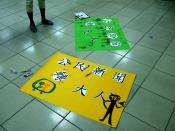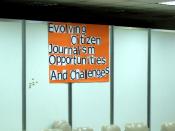Online Journalism Essay
May 6, 2010
Online Journalism and its imposter relative; Citizen Journalism
Introduction:
The topic I have chosen for my essays centre's around online journalism
and the growth in citizen journalism, as a result of this. In
the course of my essay, I am going to look at some of the origins online
journalism since the end of the 20th century. I will look at the relationship
that has emerged between online users and media agencies as a result of this
growth. I will then examine what kind of effect this relationship has had on
citizen journalism in an online context.
There are many challenges working in the field of digital journalism.
Kawamoto states that "Digital Journalism is a difficult concept to define
precisely because it can mean different things to different people. In fact,
the term is juxtaposition of old and new concepts[1]."
Kawamoto proposed a definition of digital journalism - "The use of digital
technologies to research, produce, and deliver (or make accessible) news
and information to an increasingly computer-literate audience."
While this
definition broadly covers the main areas that are compassed in digital
journalism, it also highlights one major problem which is blurring
professional lines; anybody can be a journalist.
Pavilik showed how changing technologies have influenced journalism in
four main areas; how journalists do their work; the content of news; the
structure or organization of the newsroom; and the relationships between
or among news organizations, journalists and their many publics[2]. Citizen
journalism directly affects three out of these four areas.
The internet has provided key changes in the media/societal
relationships[3]. The media has become more democratized because
of online journalism as new technologies allow for greater participation; i-
pad's, i-phone's, Blackberry's, Mobile Phones, Facebook, Linked-In, Twitter
etcâ¦
"The successful local paper of today has gone far towards, and is prophetic
of, the larger local journalism which will parallel the needs of the primary
unit of democracy, the small town. But it has only begun to realize the
possibilities of its field from the standpoint of intensive cultivation, both on
the news and business sides. In the town today, there is a growing need for
intercommunication between people."
- Harris and Hooke[4] (1993, p viii)
Well before the age of the internet, the importance of interaction between
community members and newspapers has been recognized. For a
newspaper to be successful even on a national level, it needs to engage with
its audience. In a technological age of information, this is even truer[5].
Not only does online journalism need to engage with its community in a
relevant manner, but it also needs to feed them constant, timely news. As
Imfeld and Scott stated[6], "⦠the traditional relationship between
newspapers and readers is changing."
In a survey carried out in 2002[7], out of the 143 million Americans who
said they used the internet monthly, more than 90 million of them had
participated in some form of participation online; a feature which is only
becoming more and more common.
In recent years, the popularity of blogs[8] has increased ten-fold, many of
which have a journalistic category to them. Many of them are not written
by journalists. As Artwick[9] stated "And, what about Weblogs⦠are they
journalism?⦠Blogs can act as catalysts⦠flag ideas that the news media can
cover in greater depth⦠shape readersâ¦"
But as Artwick pointed out, information posted to a blog, or any other form
of online media for that matter, cannot be trusted. A journalist or news
agency does not know if the information is reliable until it is possibly too
late. It is essential that the information digital media uses from online
sources stand up to the test of credibility, just as strongly as traditional
sources. This is one of the major flaws of citizen journalism.
Not only do new technologies allow for new ways for society to stay in
constant contact with each other, but they also provide new ways to make
media production much more accessible[10]. If non-journalists witness a
news-worthy event occurring they can take a picture or video of it with
their phone, update their friends about it on various social networking sites,
create a blog post on their website about the event they just witnessed or
email the information into a prominent news agency within minutes of the
event happening. Not only is the media online now potentially available to
millions of people, but it also potentially being created from millions
of different people; people who aren't journalists. They are 'citizens' of our
society, who are becoming integral to the collection and dissemination of
news stories. Our content is being generated by online users for other
online users.
While on the surface, the practice of citizen journalism may seem like a
positive trend which allows for coverage of major news events to be
widespread and instant, as I already examined, there is no way to verify
online user media content until it is possibly too late. Even in the early days
of the internet, when there wasn't as much information and sources to sift
through as there is today, problems arose from citizen journalism.
Following the Oklahoma City bombing in 1995[11], Newsday, USA
Today and The Dallas Morning News among others stated that the
bombings had been carried out by a militia group, citing a post on the
group's website as the source. The website was false and had been created
by a student at the University of Montana.
After 9/11, more and more Americans turned to the internet to stay
updated about the war in Iraq[12]. "Warblogs" by citizen journalists
became common place[13]. Citizen journalism is a trend that continues to
grow and grow. Daily Kos[14] is a liberal daily weblog which gets more
views daily than most newspapers[15]. iBrattleBoro.com is purely citizen
journalism website[16]. Its content is generated, moderated and
updated by the ordinary members of the community in Vermont.
Wikipedia[17] is an online encyclopaedia that is a complete web-based,
collaborative effort. Anybody can edit or post an entry on to Wikipedia. It
is not a reliable source in anyway; yet in 2006 it was reported that
Wikipedia was the 12th most viewed website daily[18].
Online journalism now allows for communities to be at the heart [19] of
informative news flow. Acts of journalism can now be performed by
anybody. Tech News World says that bloggers who break news
stories ahead of mainstream media appear "to be a new and emerging breed
of journalist[20]." The Mumbai attacks demonstrated the power of social
networking sites like Twitter to break major news events. Within minutes of
terror attacks in Mumbai, India, Twitter, blogs and other social networking
sides had a plethora or pictures, videos and eye-witness accounts being
posted online[21]. A lot of the information which was published online by
these citizen journalists was picked up by global news agencies and used in
their broadcast.
Conclusion:
Online journalism has created a dramatic change not only in how we view
our news, but where our news comes from. Acts of citizen journalism have
always occurred in the media, but due to the wide-spread digital element of
journalism these acts are now being more frequent and prominent in our
news information. In our digitized society, the question is no longer who is
a journalist, but what is journalism[22].
While acts of citizen journalism have enabled society to gain information
about sudden events faster, it is not a reliable source of information for the
profession of journalism to be depending on. As Robinson[23] stated, "â¦
journalist's compose the map to yesterday so that the country can navigate
a similar situations tomorrow⦠through a lends of hindsight, politicizing it
and polishing its memory as they propose agendas for change." However, I
don't believe that this is a trend that is going to disappear.
Standards are set in the profession of journalism for a reason. NUJ
members need to abide by a Code of Conduct[24] in order to ensure that
their work is of the highest standards. Citizen journalists do not need to
abide by such code. Their work doesn't need to be unbiased, well written or
even true in some cases. The truth of the matter is that the availability of
citizen journalism is just too tempting for the media to pass up. Online
journalism has changed everybody's news that they receive; whether
you use the internet or not. But Ordonez[25] made an important point to
remember when dealing with citizen journalism. "While it is true that
journalists are communication professionals, the reverse does not hold
true. "


